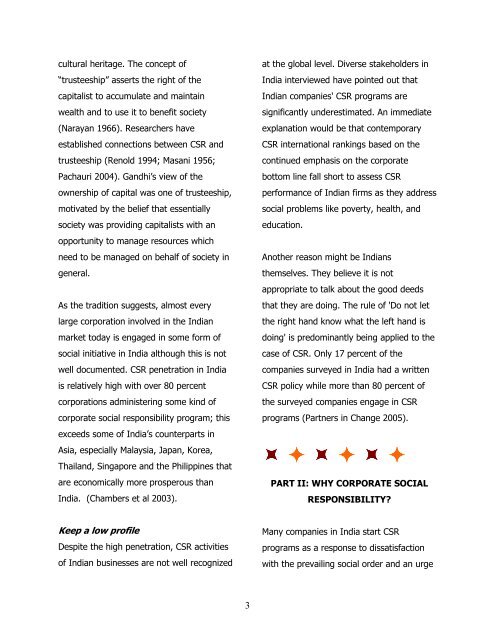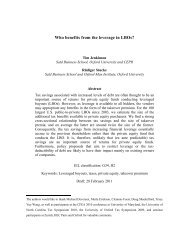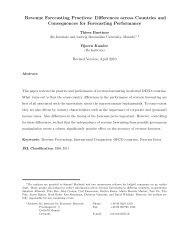Corporate Social Responsibility in India - Said Business School
Corporate Social Responsibility in India - Said Business School
Corporate Social Responsibility in India - Said Business School
Create successful ePaper yourself
Turn your PDF publications into a flip-book with our unique Google optimized e-Paper software.
cultural heritage. The concept of<br />
“trusteeship” asserts the right of the<br />
capitalist to accumulate and ma<strong>in</strong>ta<strong>in</strong><br />
wealth and to use it to benefit society<br />
(Narayan 1966). Researchers have<br />
established connections between CSR and<br />
trusteeship (Renold 1994; Masani 1956;<br />
Pachauri 2004). Gandhi’s view of the<br />
ownership of capital was one of trusteeship,<br />
motivated by the belief that essentially<br />
society was provid<strong>in</strong>g capitalists with an<br />
opportunity to manage resources which<br />
need to be managed on behalf of society <strong>in</strong><br />
general.<br />
As the tradition suggests, almost every<br />
large corporation <strong>in</strong>volved <strong>in</strong> the <strong>India</strong>n<br />
market today is engaged <strong>in</strong> some form of<br />
social <strong>in</strong>itiative <strong>in</strong> <strong>India</strong> although this is not<br />
well documented. CSR penetration <strong>in</strong> <strong>India</strong><br />
is relatively high with over 80 percent<br />
corporations adm<strong>in</strong>ister<strong>in</strong>g some k<strong>in</strong>d of<br />
corporate social responsibility program; this<br />
exceeds some of <strong>India</strong>’s counterparts <strong>in</strong><br />
Asia, especially Malaysia, Japan, Korea,<br />
Thailand, S<strong>in</strong>gapore and the Philipp<strong>in</strong>es that<br />
are economically more prosperous than<br />
<strong>India</strong>. (Chambers et al 2003).<br />
Keep a low profile<br />
Despite the high penetration, CSR activities<br />
of <strong>India</strong>n bus<strong>in</strong>esses are not well recognized<br />
3<br />
at the global level. Diverse stakeholders <strong>in</strong><br />
<strong>India</strong> <strong>in</strong>terviewed have po<strong>in</strong>ted out that<br />
<strong>India</strong>n companies' CSR programs are<br />
significantly underestimated. An immediate<br />
explanation would be that contemporary<br />
CSR <strong>in</strong>ternational rank<strong>in</strong>gs based on the<br />
cont<strong>in</strong>ued emphasis on the corporate<br />
bottom l<strong>in</strong>e fall short to assess CSR<br />
performance of <strong>India</strong>n firms as they address<br />
social problems like poverty, health, and<br />
education.<br />
Another reason might be <strong>India</strong>ns<br />
themselves. They believe it is not<br />
appropriate to talk about the good deeds<br />
that they are do<strong>in</strong>g. The rule of 'Do not let<br />
the right hand know what the left hand is<br />
do<strong>in</strong>g' is predom<strong>in</strong>antly be<strong>in</strong>g applied to the<br />
case of CSR. Only 17 percent of the<br />
companies surveyed <strong>in</strong> <strong>India</strong> had a written<br />
CSR policy while more than 80 percent of<br />
the surveyed companies engage <strong>in</strong> CSR<br />
programs (Partners <strong>in</strong> Change 2005).<br />
���� ���� ���� ���� ���� ����<br />
PART II: WHY CORPORATE SOCIAL<br />
RESPONSIBILITY?<br />
Many companies <strong>in</strong> <strong>India</strong> start CSR<br />
programs as a response to dissatisfaction<br />
with the prevail<strong>in</strong>g social order and an urge
















